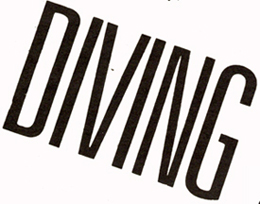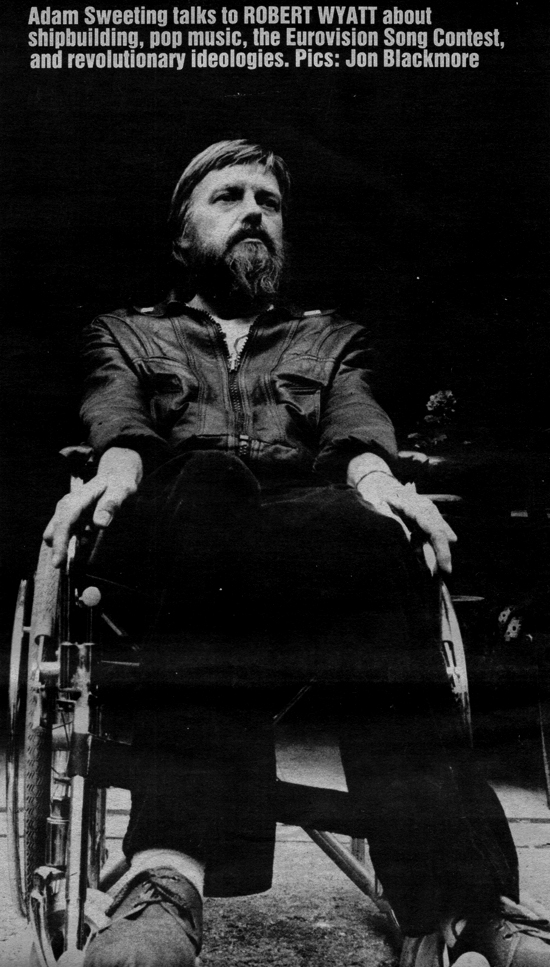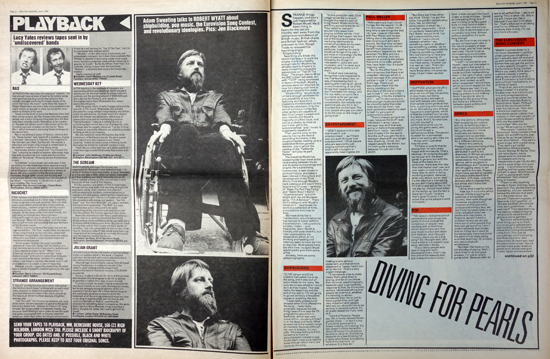| |
|
|
 Diving For Pearls - Melody Maker - June 4, 1983 Diving For Pearls - Melody Maker - June 4, 1983
|
| |
|
|
Strange things happen, and one's just happened to Robert Wyatt . He'd been living in Spain for the last six months, well away from the vertiginous roundabout of British music, British charts and British fashion, when, unknown to him, Rough Trade re-released his haunting single "Shipbuilding".
Next thing you know, the record had begun to scale the singles charts at a healthy enough rate for Wyatt to be whisked back to England to ready himself for a possible appearance on "Top Of The Pops". The single rose to 35 on the BBC's chart last week, but with "TOTP" being shortened in favour of football, Wyatt's services were not required. So now he's staying over here to see what happens this week.
"Shipbuilding" would be an unlikely enough candidate for pop playability at any time, featuring as it does Elvis Costello's mordant slant on the Falklands cataclysm, lit by the sort of luminous ironies few other writers are capable of.
Add Clive Langer's sweet-and-sour melody and Wyatt's tragically crucified vocal, and you're probably as close as you'll ever get to the subversiveness "pop" music is supposedly capable of.
Then, put the icing on the cake by having the record ascending the charts in the couple of weeks leading up to a watershed British general election, one in which the residue of the "Falklands Factor" will play its part. Perfect!
The maverick Wyatt has looked harder than most at the relationship between music and its social surroundings and origins. He's a practising Communist, is well versed in political history, and takes a keen interest in the culture and development of the Third World. Flick through Wyatt's back catalogue and you'll find a bizarre trail of clues - versions of "Keep The Red Flag Flying" and "Stalin Wasn't Stallin' ", "Guantanamera" and a hit single with the old Monkees' song, "I'm A Believer". There isn't a category with Wyatt's name on it - best to see his work as a collection of hints, provocations and cries for help.
We meet at his flat in Twickenham, around which he has learned to travel deftly in his wheelchair. I ask questions, he talks, I listen - and, frequently, learn. Wyatt is friendly and quite cheerful, but I feel oppressed by the desperation which all his thinking and reading and listening seem to have led him to discover. Most people have too little time. I suspect Wyatt would gladly give them some of his.
Anyway, here are some edited highlights.
"CLIVE Langer and Elvis Costello had asked me to do the song, and it was sort of tailor-made for me really. My only worry was whether I could do it as they hoped. That was really the beginning and the end of my worry. I'm not going to go out and buy a thousand copies or anything like that.
"I was really pleased and amazed when Elvis offered me the song - I was really surprised, because the last thing I saw of him was the TV programme about him in Nashville, which was very brave of him, chucking himself in at the deep end there. What amazes me is his eclectic range of interests, because although my own is eclectic, it's very bitty. Whereas talking to Elvis, he seems to have an encyclopaedic interest in pop music itself. I was surprised he knew enough about me to ask me to do the song.
"In this particular case, Clive Langer wrote the tune and thought this was the sort of thing Robert Wyatt could do, and Elvis put some words on. They certainly realised I wouldn't shy away from singing political words. I find that things that happen like this out of the blue work better than me trying laboriously to construct projects on my own, very often. So there's no particular incentive for me to construct things of my own. I put most of my energy into the sort of passive pursuit of following the things I'm interested in, culturally and musically, and I'm never sure what's going to come out of them.
"A lot of very interesting things that have happened to me, I've found absolutely no way of expressing them or dealing with them at all, which is very frustrating. A lot of the things that happen to you just don't translate into songs, and I'm not really cut out to be a journalist as far as I can see. I've done a bit of writing occasionally, but nobody ever seems to pay you for it, so I knocked that on the head. The only people who pay you seem to be the ones on the verge of going bust."
"I DON'T believe in this idea that music's 'just entertainment' - as if there was any such thing as 'just entertainment'. I think people who are apparently just singing something that's totally self-indulgent or apparently meaningless are making a very serious statement, and that serious statement is 'I exist, I want you all to like me'. That's a very urgent message.
"If somebody tries to dress nicely that's what they're saying, and for all you know their survival, psychologically, depends upon a sympathetic response to that. So it's terribly serious. I think everything that people do is serious, whether it's dancing, to attract somebody they like or just to have a good time, and I get very impatient with people who say you shouldn't try to be serious in escapist culture. It's all pretty desperate if you look at it.
"I think of flowers. People say 'Oh, a lovely relaxed flower garden there' - in fact it's not. If you think about what a flower's doing, he's saying 'If a bee doesn't notice me within about 24 hours I'm not gonna be able to carry on. Everything depends on a bee thinking I'm a really sexy flower and getting hold of my stamens', or whatever it is they do."
" He knows more than I did at his age. For the record, I'm 38. I'm very slow, it's taken me a long time to see things the way I do now. I saw an interview with Paul Weller and he was talking about the people he was conscious of who were around. Not that they've been through more, but you sort of benefit from previous generations' experience. He's watched The Who and he's seen this and that, and he's capable of avoiding the pitfalls that some of us older people may have fallen into. It's quite inspiring really.
"But on the other hand, I'm very conscious that there is an unspoken ideology which is much stronger than conscious politics in rock 'n' roll, and that's age. There is an assumption there that the young standing on the shoulders of the old is in fact a law in rock 'n' roll, and it fits everything, it fits the marketing of it... so I'm very conscious that younger musicians would be uncomfortable that older ones would like them, 'cos each generation seems to need to feel it's got a sort of autonomous culture.
"There's always going to be a gap, because the stuff I was interested in when I was a teenager was stuff that was going on before those people were born, really. I wouldn't have missed it for the world. And the stuff you get into as a teenager stays with you longer than anything, I think. So I respect people like Weller, but it's from quite a distance, because I'm just not in that world.
"But there are times when you think 'Christ, I've got this voice, I've got this constituency if you like, an informal constituency of what I do, I must feel responsible'. I think it's perfectly reasonable that Paul Weller should think 'I've got a responsibility here, therefore I have a choice between whether I say something useful or whether I say something useless', so he gives himself the responsibility of saying something useful. He's not claiming to have any power, he's just saying 'if I have, and it seems as though I may have some, I'd better use it as well as I can'. That's fair enough. Because we don't really know what influence we have, it hasn't been worked out."
"I SUPPOSE what set me off is what keeps me going, and what set me off was not politics or pop music, but being brought up as a teenager to deal with people who called themselves avant-garde at that time, in painting and music and so on. Something very strange happens to avant garde, which is that the moment you've said it or done it it's not avant garde any more. And if, for example, you call yourself a performance artist you're giving the game away, and you're no longer a performance artist. The person to watch for is somebody who's not saying who they are - things aren't just what they're called.
"I'd have to qualify that by saying that I'm very rarely happy with the results. That's because I think being brought up not just with the avant garde in general but with the ideas of the Dada era in particular, there was this idea that manifested itself over and over again in rock music, that there was no point in doing anything properly, because when you sketch out an idea it's the idea that's interesting, so you don't hang about and fill it all in and dot all the i's. I'm not saying I should have tidied all my songs up, but the fact is there isn't much I ve done that's quite finished in the sense that some people's work is finished."
"THE reason I did some sort of conventional pop songs was partly to move outside the consensus of people I was working with at that time, which would have said that pop music is a dull and dead-end medium. And I thought 'hmmm, could you do a pop song?' So I thought well, let's have a look at a successful pop song, see how it works.
"If you talk to people who deal in long and really developed music, they'll say that one of the reasons that pop is bound to be a minor form is that you can't do much in two or three minutes. I found an interesting thing, that if you're trying to write a good tune it's very hard to make it last longer than one minute, and in fact three minutes is an incredibly long time. Almost without exception it's quite long enough.
"By the time three minutes is up you've heard each idea in the record probably at least three times, and far from being restricted, I found it just as intimidating to try to create three interesting minutes as anything longer.
"I didn't try and write one myself, I was just interested in taking apart a few good or successful pop songs from the inside and then reassembling them in the light of what I could do, just to see what made them work. And I ended up with what I suspected I would have, which is a lot of respect for the craft. People say 'well it's so limited', but so is making pots. Making pottery is not making Rodin's sculpture, you're looking for the wrong thing, but there is a difference between good pottery and crummy pottery."
"ALL this century, Africa has been supplying our culture with its revitalising juices. I don't think musicians should feel guilty about it, I think musicians are relatively innocent and so are their audiences, they're just looking for a different stimulus.
"Within this century, Picasso's revolutionising of the world of painting can be attributed in part to his discovery of African sculpture and wood-carving. He's celebrated as this innovative genius, while sculptors in Mozambique and Tanzania are still struggling away to sell their work to tourists. Picasso might have wanted to transfer the status of the world he'd inherited, of Europe, onto the Africans who'd inspired him, but artists don't have that much power.
"I think what's sad for artists ... if we live in a country which has got rich by crippling the potential of some other country, then even though we ourselves are personally innocent of this economic, political and military fact, we can't help but participate in an unfair situation when we continue to use others. In England, we still inherit a situation where we can get more out of other people than they can get out of us. I don't expect anybody else to take that on if they don't want to, but personally it worries me to the point of not really being sure that anything I do is really any use to anybody whatsoever.
"But then I fall back on my old standby of saying 'Well, I never tried to do any good anyway, I'm just an avant-garde artist'. Because after all, we're all selfish first - we're all saying This is what I do, this is my act, I hope you like it because if you don't I'm done for'. That's what we're all doing and I'm no different from anybody else in that, I'm not any more altruistic."
| THE EUROVISION SONG CONTEST |
|
"WHEN it comes down to it, I'm more interested in politics under particular situations. I don't actually start off and end up with some sort of overview. Sometimes you get the politics in a very specific situation, like the Eurovision Song Contest. Where you really think about it is where nobody's overtly talking about politics at all. I think Eurovision is just bristling with political implications, on all kinds of layers.
"First of all, why a Eurovision Song Contest? It's slightly broader than that ridiculously tiny and unrepresentative group of countries called the EEC which excludes Austria, Scandinavia, Spain, Portugal and all the countries further east, but not much. Then why is there this tradition that everybody sends rubbish that nobody in their own country of origin knows anything about? Who are the selection committee? Who are the juries? What's going on there?
"The reason I mention the Eurovision Song Contest is that Spain did something this year that as far as I know nobody's ever done before - they sent a great singer with a great song. They sent a girl called Remedios Amaya singing 'Quien Maneja Mi Barca'. Poor old naive Spain, trying desperately to impress the Europeans and trying desperately to get into the EEC, send a good singer and good song - a bit of electronic ska backing and her gypsy vocals and we're away. And of course it got no points at all, none whatsoever. Very unusual thing to happen.
"There's a very touching naivety in Spain and they really were hurt, they started blaming themselves, and you wouldn't believe the debates that went on in the press about 'we shouldn't have sent a gypsy, all Spaniards aren't gypsies', or 'she was barefoot, she should have worn good shoes' - oh, awful stuff. They were blaming themselves instead of saying 'what a cloth-eared bunch of gherkins we've got here'.
"But there were all kinds of other things going on there. Countries gave spectacularly bad marking to the countries where their immigrant workers come from. This may be coincidental, but it's amazing that West Germany, who presumably 30 years ago, had the opportunity arisen, would perhaps have given Israel no points at all, would now give Turkey, Spain and anywhere with gypsies in it no points at all - because the current xenophobia in West Germany is about Spanish and Turkish immigrant workers.
 |
"Then you think well maybe the Israelis will appreciate this song, because it's part of the southern Mediterranean tradition that Remedios Amaya is coming from — you could recognise Middle Eastern folk influences in what she does. But nothing from Israel, because Israel is trying to be more northern European than the northern Europeans. They don't want to know about anything that sounds like gypsies, as far as I can see.
"And then Yugoslavia got nothing from Austria, and Yugoslavia is where Austria's guest workers come from. Not that it's all political, it's just that that's an element in it that's totally ignored, because it's just 'fun, fun, fun'. And as I say, it's not fun, fun, fun, it's Remedios Amaya crying on behalf of Spain for help. There's no such thing as light entertainment, it's all much more desperate."
KILLING PEOPLE FOR AN IDEOLOGY
"I DON'T think killing's the worst thing you can do to people. The usual slogan of liberation movements goes something like 'Better to die on your feet than to live on your knees', and really what I do is ... I will support certain people who have come to that conclusion if I've read their history and I agree with them that they have no alternative.
|
"The second question is whether that's necessarily effective — it's a moot point. Means become ends in politics and that's always a danger. But really what's so unfair about the image given to various liberation movements I sympathise with is that violence wasn't talked about until they reacted to it - then they're called the violent ones. It's extraordinary the amount of perhaps hopeless, perhaps hopeful violence our Empire has caused as a reaction, and it seems to me that basically we must look for the cause of that in what we were doing there in the first place.
"To take some very obvious examples, if you remember that according to some Namibian liberation fighters that when the English took over the concentration camps from the Germans they got worse, then you begin to see what we're up against. I don't think anybody would seriously say that the French Resistance were wrong to keep up the armed sabotage against the Nazi occupation of France. In fact the people who get despised tend to be the collaborators, people who said 'well let's try and make it work under a Vichy government'. And I think certainly that people living in Namibia and El Salvador find themselves in that position."
THE BIBLE OR MARX ?
"MOST of us, whether we admit it or not, are probably brought up with the New Testament drummed into us at one stage or another. There's a lot of very clear moral advice in that which I find very few defenders of Christianity taking any notice of, and one of those pieces of advice is taking the mote out of your own eye. And I think that our responsibility is towards the casualties and deficiencies caused by how we ourselves operate, how our countries operate.
"To me, what seem to be the most unreasonable and totally unpalatable aspects of the so-called Socialist alternative that exist, the worst thing about them is when they try to imitate Western imperialism — technically, when they imitate the British Empire's global sort of spider web, or ideologically when you get people using Marxism as a sort of global idea ... The precedent for that is Christianity - the Pope does exactly the same about what he believes. The Pope is very compassionate about all the Indians being slaughtered in South America at the moment, but the fact is that the ideas that he represents are ideologically totalitarian.
"It's the Mediterranean religions of Islam, Judaeism and Christianity which first suggested this absolutely terrifyingly revolutionary idea of a single mono-God that was totally running the whole show, to whom we must all be servile. That's totalitarianism, that is. I think that having set these precedents, the Bible in one hand and the sword in the other, and becoming so successful at it, it's incredibly hypocritical the way we sort of wag our fingers at people who, in trying to be successful, use elements of these approaches to get their place in the sun.
"If we really think those ideas are bad, then we must debunk them here, because then we won't inspire other people to emulate us."
PARTING SHOT
"SOMEBODY once said to me that I'm very easy to talk to, but very hard to interview."
|
| |
|
|
|
|









